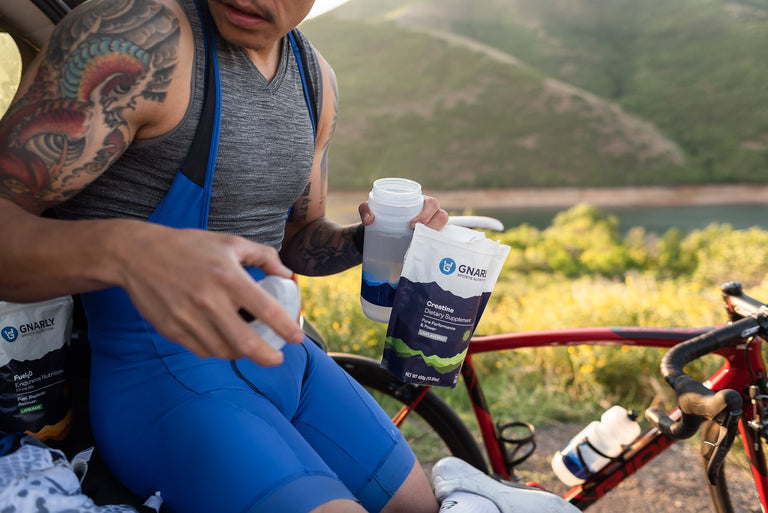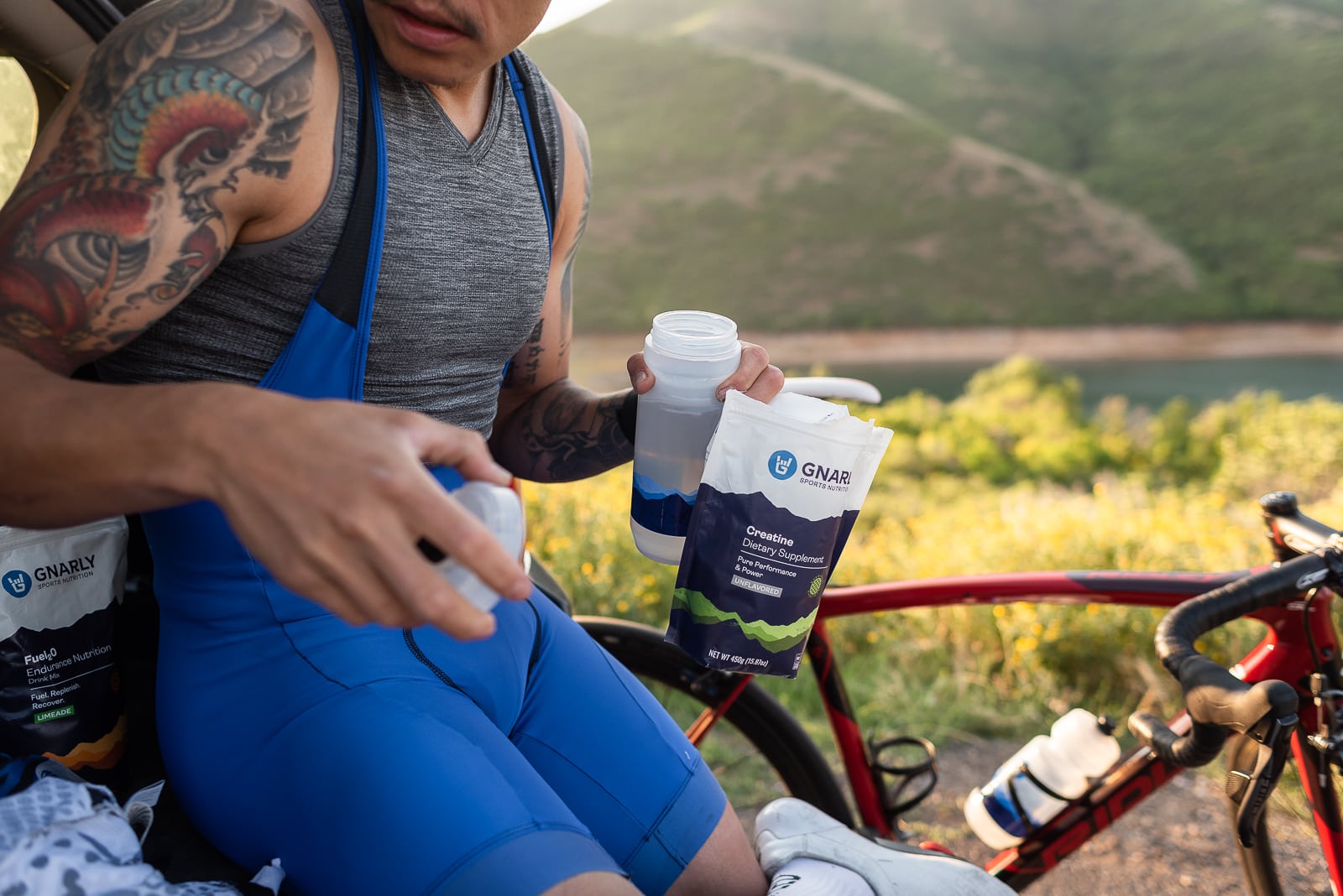Creatine supplementation is well known for its capacity to increase power and strength, enhance post-exercise recovery and prevent injury. But there are some other surprising areas of research suggesting that creatine supplementation might be beneficial.

Minimizing Muscle Loss & Strength While Immobilized or in Rehab
It’s paramount for an injured athlete to eat enough calories and total protein to maximize recovery. For the athlete in a cast or limited mobility in a boot/sling, muscle atrophy is inevitable. However, one study suggests that creatine may aid in minimizing strength loss while immobilized in a cast. Study subjects (all were male) had their arm immobilized for 1 week and took a sugar water placebo daily, then the cast was removed and a cast was placed on the other arm for 1 week and the subjects consumed 4, 5 gram servings of creatine per day. Lean tissue mass, elbow flexion/extension strength, and endurance were assessed at baseline, postcast, and after the study. Creatine maintained better arm flexion endurance and strength compared to placebo. However, there was no significant difference in muscle losses between creatine and placebo.(1)
Another study involving creatine supplementation with cast immobilization and a 10-week heavy resistance training rehab program showed that subjects who supplemented creatine preserved more muscle mass than the placebo (sugar) group and stimulated more muscle growth during rehab than the placebo group.(2)

While these two studies are promising, there are other studies involving creatine supplementation with immobilization that show no benefit to preventing muscle loss. One of these studies involved 25 male subjects, wrist immobilization while ingesting 20 grams creatine per day for one week.(3) A randomized controlled trial found that creatine loading didn’t preserve muscle mass or strength during 7-day leg immobilization in young men.(4) An interesting feature of that study was that even when “non-responders,” which were those who did not show elevated stores of muscle creatine after supplementation were removed from the data, there was still no effect seen.
Similarly, another study found no effect of 20 gram/day of daily creatine supplementation in preserving quadriceps muscle or knee-extension power.(5) However, throughout a follow-up 10-week program of rehabilitation training where creatine supplementation was reduced to 15 grams, then 5 grams, quadriceps and knee-extension power recovered at a faster rate in subjects supplementing with creatine versus placebo. What’s even more fascinating about this study is, myogenic protein expression (the controllers of muscle growth), was significantly increased in the creatine group during rehabilitation and strongly correlated with muscle fiber diameter increases. This suggests that creatine supplementation may increase the rate of recovery during rehabilitation.(5)
While the data is mixed, it appears creatine supplementation might be helpful in minimizing muscle loss and strength during immobilization and increasing muscle size and strength during rehab.
Concussions
Creatine helps us create energy in the form of ATP, including in our brain. Creatine stores are known to reduce after a concussion. There is limited research on creatine supplementation on the treatment of concussions, also known as traumatic brain injuries (TBI). Multiple studies in mice indicate there may be some benefit, however human studies are lacking and needed. One promising pilot study using creatine as a treatment method for moderate to severe TBI in children had promising results. Participants were given 0.4 g/kg of creatine daily for 6 months. After 6 months, the creatine supplementation group had overall better markers of recovery than the control group, including markers in: cognition, personality/behavior, self-care, and communication.(6) A follow up study suggested that the children treated with creatine had less dizziness, headaches, and fatigue than the control patients.(7) There were no negative side effects reported in either study, further suggesting that these results are promising.
Spinal Cord Injuries
People with spinal cord injuries (SCI) often suffer from muscle and strength loss. While studies are limited, a couple randomized, double-blind, placebo-controlled studies have promising results. One study on individuals with SCIfound that 20 grams per day of creatine had better work capacity after 7 days compared to controls.(8) Another study that used just 3 grams per day in SCI participants for 8 weeks in a resistance training program found that creatine supplementation improved upper body strength more than controls.(9)
Depression
How could creatine possibly be connected and related to depression? There is actually a connection between cerebral spinal fluid levels of creatine and dopamine and serotonin metabolites, suggesting that efficient neurotransmission of metabolites affecting mood relies on the creatine phosphagen system functioning appropriately.(10) White matter (in the brain) creatine content is inversely linked with severity of depressive episodes.(10) Creatine may be able to influence energy production and usage in the brain, and there is clinical evidence to support that creatine supplementation had positive effects on mood, possibly by resorting brain energy levels.(10) Multiples studies in mostly women and adolescents showed positive effects of creatine supplementation and lower depression ratings at various dosing from doses ranging from 3-10 grams daily.(11) While this information is by no means intended to replace pharmacological interventions of depression, it addresses other potential treatment options, especially as not everyone responds to the same treatment.
Pregnancy
There are no human studies evaluating creatine supplementation during pregnancy. However, some animal models indicate that creatine supplementation may reduce brain injury associated with a baby not receiving enough oxygen in-utero, during, and after birth. As pregnancy increases a female’s metabolic demands to support growth and development, it is associated with reduced creatine content in the body. A reduction in creatine stores during pregnancy is linked with low birth rate and pre-term birth.(10) Given these correlations and the safety of creatine supplementation, females may benefit from supplementing creatine for the potential to reduce birth complications.
Heat Tolerance During Exercise
Many studies indicate that creatine supplementation with and without the additional of glycerol, particularly at loading doses (20 grams daily) may help reduce the risk to heat related-illness during exercise, likely due to the short term fluid retention associated with loading doses, which would indicate hyper-hydration.(12) One study found that creatine supplementation for 7 days prior to exercising to exhaustion in the heat increased intracellular water and reduced heart rate, rectal temperature, and sweat rate in prolonged exercise.(14) Multiple other studies evaluating creatine alone and with glycerol (an agent that helps one retain fluid) showed positive results for exercising in the heat.(12) This suggests that creatine loading may be advantageous to do before a key event in the heat.
Works cited
- Johnston, Adam P W1; Burke, Darren G1; MacNeil, Lauren G1; Candow, Darren G2 Effect of Creatine Supplementation During Cast-Induced Immobilization on the Preservation of Muscle Mass, Strength, and Endurance, Journal of Strength and Conditioning Research: January 2009 – Volume 23 – Issue 1 – p 116-120 doi: 10.1519/JSC.0b013e31818efbcc
- Effect of Oral Creatine Supplementation on Human Muscle GLUT4 Protein Content After Immobilization. B. Op ‘t Eijnde, B. Ursø, E.A. Richter, P.L. Greenhaff, P. Hespel. Diabetes Jan 2001, 50 (1) 18-23; DOI: 10.2337/diabetes.50.1.18
- Fransen, J.C., Zuhl, M., Kerksick, C.M. et al. Impact of creatine on muscle performance and phosphagen stores after immobilization. Eur J Appl Physiol 115, 1877–1886 (2015). https://doi.org/10.1007/s00421-015-3172-2
- Backx EMP, Hangelbroek R, Snijders T, Verscheijden ML, Verdijk LB, de Groot LCPGM, van Loon LJC. Creatine Loading Does Not Preserve Muscle Mass or Strength During Leg Immobilization in Healthy, Young Males: A Randomized Controlled Trial. Sports Med. 2017 Aug;47(8):1661-1671. doi: 10.1007/s40279-016-0670-2. PMID: 28054322; PMCID: PMC5507980.
- Hespel P, Op’t Eijnde B, Van Leemputte M, Ursø B, Greenhaff PL, Labarque V, Dymarkowski S, Van Hecke P, Richter EA. Oral creatine supplementation facilitates the rehabilitation of disuse atrophy and alters the expression of muscle myogenic factors in humans. J Physiol. 2001 Oct 15;536(Pt 2):625-33. doi: 10.1111/j.1469-7793.2001.0625c.xd. PMID: 11600695; PMCID: PMC2278864.
- Sakellaris, G MD; Kotsiou, M MD; Tamiolaki, M MD; Kalostos, G MD; Tsapaki, E MD; Spanaki, M MD; Spilioti, M MD; Charissis, G MD; Evangeliou, A MD Prevention of Complications Related to Traumatic Brain Injury in Children and Adolescents With Creatine Administration: An Open Label Randomized Pilot Study, The Journal of Trauma: Injury, Infection, and Critical Care: August 2006 – Volume 61 – Issue 2 – p 322-329 doi: 10.1097/01.ta.0000230269.46108.d5
- Sakellaris G, Nasis G, Kotsiou M, Tamiolaki M, Charissis G, Evangeliou A. Prevention of traumatic headache, dizziness and fatigue with creatine administration.A pilot study. Acta Paediatr. 2008; 97:31–34.
- Amorim, S.; Teixeira, V.H.; Corredeira, R.; Cunha, M.; Maia, B.; Margalho, P.; Pires, J. Creatine or Vitamin D Supplementation in Individuals with a Spinal Cord Injury Undergoing Resistance Training: A Double-Blinded, Randomized Pilot Trial. J. Spinal Cord Med. 2018, 41, 471–478.
- Hausmann, O.N.; Fouad, K.; Wallimann, T.; Schwab, M.E. Protective Effects of Oral Creatine Supplementation on Spinal Cord Injury in Rats. Spinal Cord 2002, 40, 449–456.
- Smith-Ryan, A. E., Cabre, H. E., Eckerson, J. M., & Candow, D. G. (2021). Creatine supplementation in women’s health: A lifespan perspective. Nutrients, 13(3), 877. https://doi.org/10.3390/nu13030877
- Kious, B. M., Kondo, D. G., & Renshaw, P. F. (2019). Creatine for the treatment of depression. Biomolecules, 9(9), 406. https://doi.org/10.3390/biom9090406
- Kreider, Richard B., et al. “International Society of Sports Nutrition POSITION STAND: Safety and Efficacy of Creatine Supplementation in EXERCISE, Sport, and Medicine.” Journal of the International Society of Sports Nutrition, vol. 14, no. 1, 2017, doi:10.1186/s12970-017-0173-z.
- Harmon KK, Stout JR, Fukuda DH, Pabian PS, Rawson ES, Stock MS. The Application of Creatine Supplementation in Medical Rehabilitation. Nutrients. 2021 May 27;13(6):1825. doi: 10.3390/nu13061825. PMID: 34071875; PMCID: PMC8230227.
- Kilduff LP, et al. The effects of creatine supplementation on cardiovascular, metabolic, and thermoregulatory responses during exercise in the heat in endurance-trained humans. Int J Sport Nutr Exerc Metab. 2004;14(4):443–60.





